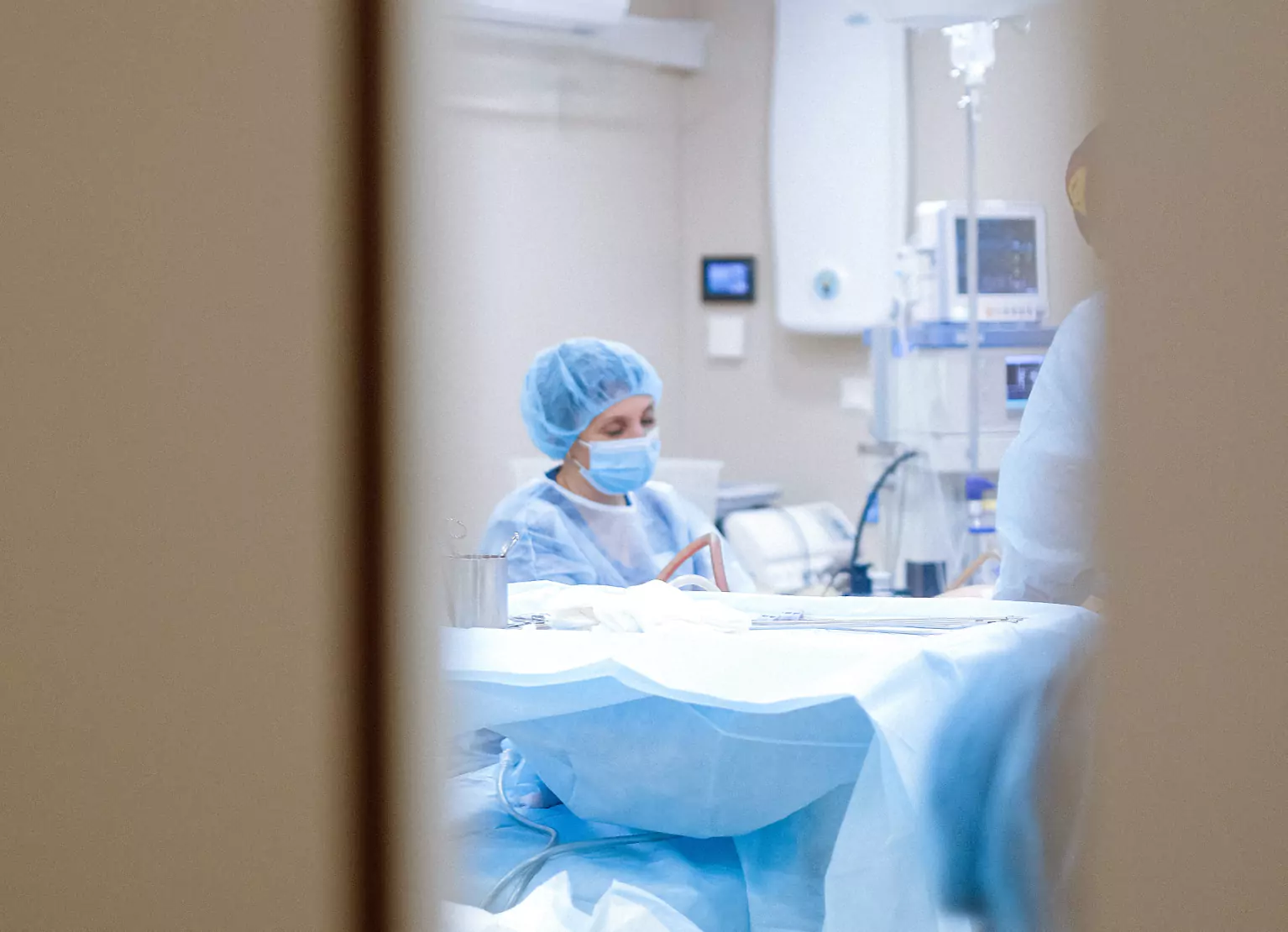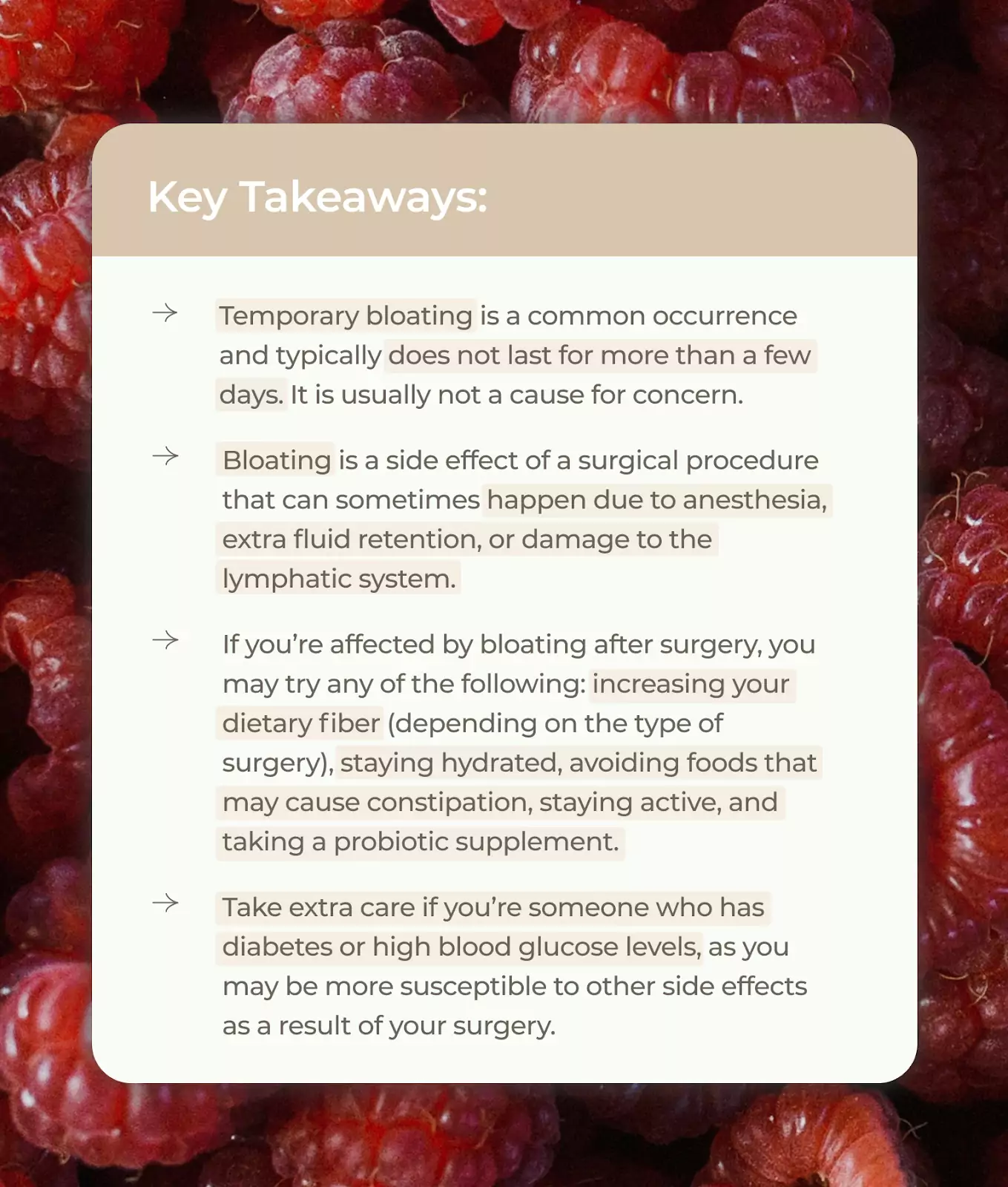Is Bloating After Surgery Normal?

Key Takeaways
After a surgical procedure or simply eating a big meal, chances are you’ve experienced bloating. While bloating is a temporary condition, it often causes discomfort and feelings of fullness and swelling in your abdomen.
But if you’re someone who experiences bloating after meals, you’ll know that symptoms are usually brief and resolve once gas is released. However, bloating that results from a surgery can be a little more complex, and it can sometimes be an unexpected part of the recovery process.
So, is bloating after surgery normal? Is there anything you can do to reduce bloating or prevent it from happening? And what causes this bloating anyway? Read on to find the answer to these questions and much more to help you combat your post-surgery swelling.
What is Bloating?

Bloating is a natural sensation in the abdomen that causes swelling, gas, and intestinal discomfort. The condition occurs when your gastrointestinal tract fills up with gas or air, and it can cause your stomach or midsection to appear visibly bigger.
While bloating is a common symptom for people with irritable bowel syndrome (IBS) and other gastrointestinal disorders, it can also appear in people who do not suffer from these conditions. Contrary to weight gain, bloating will only have noticeable effects for a few days and is not attributed to an increase in overall body mass.
Many factors may cause temporary bloating, including:
- Swallowing too much air
- Overeating
- Acid reflux
- Menstruation
- Constipation
- Gut sensitivity
- Excess water retention
- Gastrointestinal conditions
- Anxiety
- Anesthesia
Bloating and Surgery
If you're someone who has recently had surgery, you may have noticed some bloating while going through recovery.
Bloating that arises after a surgical procedure can be caused by many different factors and has been identified as a common side effect in studies tracking patient recovery after an operation.
This type of swelling is part of your body’s natural healing process, and in most cases, you don't need medical intervention to treat it.
It’s important to note that your doctor will give you instructions about preparing yourself for the appointment before the procedure. You will most likely need to implement a few dietary restrictions to prepare for surgery, including fasting and avoiding consuming liquids before the operation.
What Causes Bloating After Surgery?

A bloated stomach after surgery can cause similar abdominal swelling or discomfort that you may have experienced from overeating, IBS, or constipation, but the causes may vary.
So, how long does bloating last after surgery? Luckily, this uncomfortable occurrence is temporary. Let’s look at why you might experience bloating after a surgical procedure and what you can do to ease it.
Fluid Retention
After surgery, it’s not uncommon to experience fluid retention caused by the IV fluids your doctor pumps into your body. When you're getting ready to undergo a procedure, fluids are generally made up of sodium chloride and sterile water and administered to help keep the body hydrated.
These fluids may cause temporary bloating and even slight weight gain as your body continues to conserve renal water, but effects generally subside within several days.
Medical professionals recommend drinking plenty of fluids during your recovery process to help flush excess fluid out of your system.
Effects on the Lymphatic System
The lymphatic system is a network of vessels that drains fluids called lymph from the body. This network, part of the immune system, helps manage your body’s fluids and can be largely disrupted by surgical procedures and cause bloating.
The trauma your body experiences during surgery can also lead to lymphatic leakage and subsequent swelling when the lymphatic channels are injured during the procedure.
After a surgical procedure, you may experience bloating or swelling around the affected area as your body works to heal itself. As the body sends thousands of cells to the affected area, it’s also normal to observe bruising and swelling in the body, further indicating that your body is repairing itself.
While critical to the body’s healing process, such effects can sometimes be uncomfortable but usually heal without treatment or intervention.
A Slowdown of Gastrointestinal Functions
When you get onto the operating table, in most cases, medical professionals will administer anesthesia, pain killers, or other medications that can affect your gastrointestinal system. With bowel movements slowed down, a buildup and subsequent constipation may occur and lead to bloating.
Some studies have found that types of anesthesia like nitrous oxide may have links to bowel distress and gastrointestinal issues. Another common side effect of anesthesia is an increased chance of becoming constipated, leading to bloating, excess gas, and general discomfort.
In these studies, effects were found to last less than 72 hours and varied based on the type of anesthesia used and the patient's age, meaning that not everyone will experience similar effects.
How To Get Rid of a Bloated Stomach After Sugery

Most studies have concluded that most bloating caused after surgery will go away within a few weeks and does not require any treatment or intervention.
However, if your bloating is causing significant discomfort, there are a few things you can try to help the bloat and swelling go down faster.
Dietary Considerations
Increase Your Fiber Intake
Ensuring that you add extra fiber sources to your diet can be a great way to help your body reduce bloating and constipation, however it’s important to increase fiber intake gradually since a sudden change in fiber (either increase or decrease) can make bloating and constipation worse.
If you’re looking for easy ways to eat more fiber, try including vegetables, fruits, and whole grains into your diet. Fiber can be helpful for some, but depending on the type of surgery, you may want to consult with your doctor before making dietary changes.
Drink Lots of Fluid
Dehydration is common following a surgical procedure, so it’s essential to stay hydrated and get enough electrolytes. Drinking lots of water can also help you flush out toxins and other fluids from your body more quickly.
Avoid Foods Linked to Constipation
Since constipation can sometimes happen after surgery and lead to unwanted bloating, medical professionals advise people to limit processed foods, sweets, cheese, and high-fat meats.
Other Tips

Take a Stool Softener
If your bloating is caused by constipation, taking a laxative or stool softener will allow your body to regulate itself and clear up some of the blockages that may have contributed to your bloating.
Stay as Active as Possible
While this will depend on the type of surgery you have undergone, going for a quick walk can help activate your digestive system. It’s essential to make sure you’re cleared for physical activity by your doctor before implementing this tip.
Consider Your Medications
Some pain medications contribute to constipation and delayed digestion, so it may be advisable to stop taking them as soon as your pain subsides enough to allow you to do so.
Take a Probiotic
Probiotics are not only beneficial for gut health; they can also support wound healing, lower your risk for infection, keep you regular, and help reduce bloating. However, make sure to check with your doctor before taking any new supplements.
Does Surgery Affect Blood Sugar?
After surgery, it’s normal for your blood sugar levels to rise due to the effects of anesthesia and stress caused by your procedure's impact on your body. However, insulin resistance can develop when you experience high-stress levels and your body produces extra cortisol, which is common after a surgical procedure.
Insulin resistance requires your body to need more insulin to continue removing glucose from your bloodstream and can lead to complications for people recovering from their procedure.
If you’re someone with diabetes, it may be essential to consider certain anesthesias' effects on your blood glucose levels and your recovery process.
One study among diabetics found that experiencing hyperglycemia in the perioperative period (during the surgical procedure) may be correlated to a higher chance of experiencing poor wound healing, fluid imbalances, increased infection rates, and complications in other bodily organs during the healing process.
While being bloated after surgery is typically nothing to worry about, it's always best to discuss any concerns with your doctor.

Key Takeaways
- Temporary bloating is a common occurrence and typically does not last for more than a few days. It is usually not a cause for concern.
- Bloating is a side effect of a surgical procedure that can sometimes happen due to anesthesia, extra fluid retention, or damage to the lymphatic system.
- If you’re affected by bloating after surgery, you may try any of the following: increasing your dietary fiber (depending on the type of surgery), staying hydrated, avoiding foods that may cause constipation, staying active, and taking a probiotic supplement.
- Take extra care if you’re someone who has diabetes or high blood glucose levels, as you may be more susceptible to other side effects as a result of your surgery.
Find the right Nutrisense programto turn insight into progress.
Go Beyond Glucose Data with Nutrisense
Your glucose can significantly impact how your body feels and functions. That’s why stable levels are an important factor in supporting overall wellbeing. But viewing glucose isn't enough. Nutrisense, you’ll be able to learn how to use your body's data to make informed lifestyle choices that support healthy living.
One-to-one coaching
Sign up to access insurance-covered video calls to work with a glucose expert: a personal registered dietitian or certified nutritionist who will help tailor your lifestyle and diet to your goals.
Monitor and measure what matters
With the Nutrisense CGM Program, you can monitor your glucose with health tech like glucose biosensors and continuous glucose monitor (CGM)s, and analyze the trends over time with the Nutrisense App. This will help you make the most informed choices about the foods you consume and their impact on your health.
Find your best fit
Ready to take the first step? Start with our quiz to find the right Nutrisense program to help you take control.

Jordyn has a bachelor’s degree in biology, a graduate degree in Human Nutrition and completed a dietetic internship at the Memphis VA. She's a dietitian at Nutrisense, and has experience working as a clinical dietitian at a VA medical center specializing in oncology and at the Mayo Clinic, working with a wide range of patients ranging from neonates in the NICU to adult ICU.


.webp)

